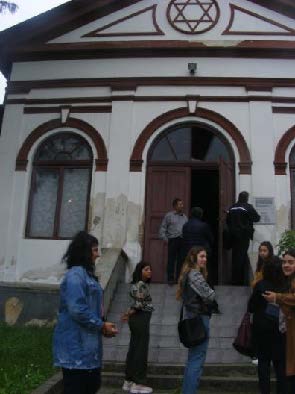Razvan Locovei
The teacher organized a week of activities through which the students enriched their knowledge and deepened their understanding of the Holocaust in general and of the Romanian context in particular. In the first part of the week the students participated in a series of lectures and discussions with the teacher on history topics related to the situation of the Jews before and during World War II in Romania. He insisted on the transition from numerus clausus (less and less Jews in public institutions and schools of all levels), to numerus nulus (no Jews in any public state function, no Jews in educational establishments), the racial legislation of the regime and specific provisions regarding the Jews, the deportation of Jews to Transnistria, the Pogrom in Iasi, the Trains of death. The students listened to recorded testimonies of Mr. Leizer Finkelstein, survivor of the Pogrom from Iasi, and Mr. Iancu Tucarman, survivor of the Trains of Death, and they read and discussed about the written testimonies of Mr. Liviu Beris, who was deported in Transnistria, and Mr. Silviu Osiovici, who witnessed the Pogrom in Bucharest. The students then watched the recording of the famous theatre play Take, Ianke and Cadyr, a play about tolerance friendship and love among a Romanian, a Jew and a Turk. The play provoked a discussion about stereotypes and prejudice. The project ended with a field trip to two places of execution (Vulturi Forest and Roznovanu Rock); the train station in Podu Iloaiei, the destination of one of the Death Trains; the Jewish cemetery in Dorohoi, a nearby town, as well as the local high school, where they had a lecture and discussion with their colleagues about war crimes and war criminals.
